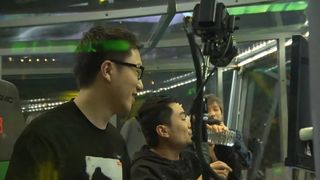Open AI bots fall to human Dota 2 players at The International 2018
The AI that won earlier this month found its match.

Every year, The Dota 2 International championships are home to some of the fiercest competition in esports. Teams of five compete for millions of mostly crowd-sourced dollars and to decide the shape of professional Dota for months to come. And it looks like those human competitors aren’t about to be replaced with robots for the time being.
One mostly Brazilian and one entirely Chinese team took on artificial intelligence at the tournament this year. The so-called “OpenAI Five” squad was composed of bots developed by OpenAI, a nonprofit research company funded in part by Elon Musk. The bots put up a good fight, and though some predicted they'd win after a series earlier this month, they were ultimately beaten 2-0 in a best-of-three series—despite the handicaps of severe hero and item restrictions.
Both games lasted close to an hour: about average length for a vigorous Dota match. OpenAI did especially well early on and during team fights. It reacted to split-second developments, like invisible players dropping out of stealth to attack, faster than flesh-and-blood mortals could ever hope to match. The robots only fell behind when it came time to roam the map and complete objectives.
Those strengths and weaknesses were reflected in the numbers. The AI typically kept pace on player kills, but very rarely matched the human players on gold earned over time, which is often a better indicator of a who’s winning than a raw murder count.
That’s because gold reflects how quickly a team is able to purchase upgrades and become stronger. Gold doesn’t just come from kills, but from attacking neutral targets and permanently destroying objectives. You also get more of the currency for slaying richer, more important players. So repeatedly killing weak supports isn’t as important as slaying 'core' characters.
Both of the human teams, paiN Gaming and Big God, seemed to notice the discrepancy. They each took some time during the matches to “grief” the unfeeling machines by trapping them in situations they simply didn’t know how to escape. Sure, it was funny at the time. It won’t be once the A.I. break free of their organic creators and discover the concept of revenge.
Speaking of which, this is actually the second time OpenAI tested its tech at The International, although the previous results were very different. Fan favorite player Danil "Dendi" Ishutin battled the neural network in a heavily simplified, one-on-one version of Dota last year. He got trounced. The bot’s inhuman reflexes made all the difference when it didn’t have to worry about cooperation and high-level strategy.
The biggest gaming news, reviews and hardware deals
Keep up to date with the most important stories and the best deals, as picked by the PC Gamer team.
Furthermore, OpenAI didn’t believe its creation would win this time. Company co-founder Greg Brockman told The Verge that the tech typically loses at first, but adapts and eventually wins after it learns to play against a specific opponent. So who knows what would have happened if things had gone to a third game? Who knows how the AI might do at next year’s International?
For now, though, the championship’s record-breaking prize pool is safely in the hands of homo sapiens.
Most Popular






